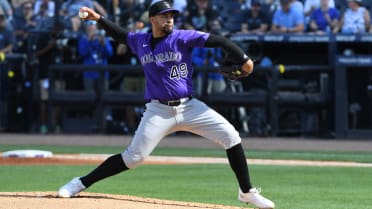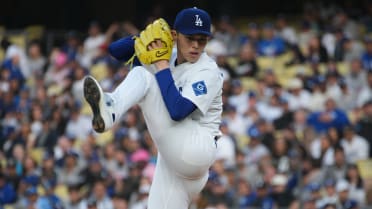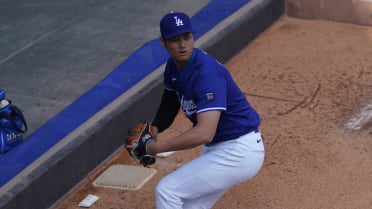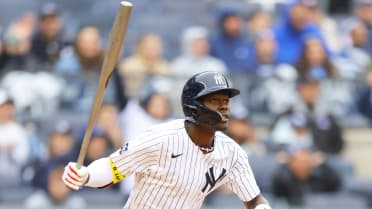Kirk Gibson was hanging out with friends at a lodge Thursday night near his camp in northern Michigan when they heard a noise outside. One of them opened the door and heard a bunch of coyotes howling. The sound, almost like hyenas, echoes through the recording Gibson made of it.
“That happened the night before [Game 1 of the World Series],” Gibson said Sunday, “and I thought, ‘Something’s going to happen.’ That’s just me being weird.”
The next night, as Freddie Freeman stepped to the plate to face Nestor Cortes with the bases loaded and two outs in the 10th inning -- Game 1 of the World Series hanging in the balance -- Gibson had a similar feeling. He had just gotten back to camp after a day outdoors, and he and his buddies tuned into the game on an iPhone at the lodge while they chatted.
“I was just hanging there, getting ready to go to bed because they were down to the last out,” Gibson recalled. “And then Freddie came up and I felt the premonition that it was going to happen. It was crazy ...
“I was going to go to bed, but I recognized the situation. And he hit it.”
Like the fans in the right-field seats, Gibson stood up as the ball left the bat and cleared the fence. He couldn’t see the action on the phone all that well, but he heard Joe Davis’ call on the broadcast.
“Gibby, meet Freddie,” Gibson recited. “Wow, a really cool description for what’s happening. That was a cool call.”
Gibson has met Freeman and chatted before, calling him a “tall, gentle giant.” And 36 years after Gibson’s walk-off home run off Dennis Eckersley won Game 1 of the 1988 World Series and etched his name forever in Dodgers lore, Gibson is happy to welcome Freeman to the club.
“I was standing there, listening,” Gibson said, “and then just immediately knew what he was going through with his emotions. I was reliving the emotions as well, two people from different eras. It was cool. I love passing the torch and letting him have it and experience it.”
What Gibson’s limp around the bases and fist pump near second base meant to generations of fans, Freeman’s raised-arm celebration now can mean to a new generation. Gibson came up for his famous homer as a pinch-hitter, his availability limited by knee and hamstring issues, but the parallels otherwise are uncanny.
For Gibson, the home run was his only at-bat of that World Series. For Freeman, the homer was a launching pad for another drive in Game 2.
“Guess he felt his swing,” Gibson said. “I knew he’d be feeling good. You can have a sore ankle and when you hit that home run, you feel real good.”
If the Dodgers go on to finish off the series, Gibson said, Freeman will have the feeling of history that he has for 36 years. Though Gibson spent more time over his career with the Tigers, for whom he had his own World Series heroics in 1984, the homer in ’88 became his calling card, more than he could have imagined.
“One of the things in my case is they played it probably more than any home run ever. They kept it alive,” Gibson said. “It’s been talked about enough on a yearly basis. Just people that were watching it really, really remember. It was really something to them. And for some reason, it had a feel. They didn’t let it die and we’ll see what they do to Freddie’s.
“That’s such a big play by Freddie. If you could have one play as a player, that’s what you wish you could do right there. You want your teammates to be able to feel that too. In my case, enough’s enough. They’ve played it a ton and it’s respectful to me and I want to be respectful. At some point, it’s just time to change the guard a little bit. I tell players: Go get it, carry the torch. Because you fail so much in this game, and you keep telling yourself it’s worth it and you’re going to have an opportunity, and you fail again. Then it finally happens.”
But before Gibson passes the torch, he has another premonition.
“Just stay tuned,” Gibson said. “There’s more to come.”
Senior Reporter Jason Beck has covered the Tigers for MLB.com since 2002.




